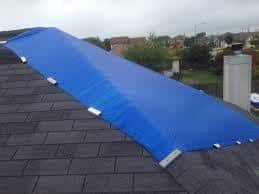Tarp a Roof is an important step in preparing your home for a hurricane. It can help prevent damage to your roof and home, and make it easier to clean up after the storm.
Roof tarps are available at most hardware stores and home improvement centers. They typically come in two sizes: 4 feet by 8 feet or 6 feet by 10 feet.
When choosing a roof tarp, make sure to select one that is rated for the wind speed of the hurricane you are expecting. For example, if you are in an area that is expecting winds up to 100 mph, you will need a tarp that is rated for at least that wind speed.
To install a roof tarp, first secure it to the eaves of your roof with hurricane straps or nails. Then, stretch the tarp over the entire roof and secure it to the other side. Make sure the tarp is tight so that it doesn’t blow away in high winds.
If you have any questions about how to install a roof tarp, please contact your local hardware store or home improvement center. They will be able to give you more specific instructions.
Roof tarps are just one of the many ways you can prepare your home for a hurricane. For more information on hurricane preparedness, please visit the website of the National Hurricane Center: www.nhc.noaa.gov.
There are places for a blue Tarp Project?
Yes, the Blue Tarp Project is a national effort to provide free roof tarps to homeowners who have been affected by hurricanes. To find out if you are eligible for a free tarp, please contact your local government office or the Blue Tarp Project hotline: 1-888-258-8733.
How can I get of hold of fema?
The Federal Emergency Management Agency (FEMA) is the agency responsible for coordinating the response to disasters in the United States. If you have questions about how to prepare for or respond to a hurricane, please contact FEMA at 1-800-621-3362.
If I have Insurance can I filed a claim for my roof?
If you have insurance, you may be able to file a claim for damage to your roof. Contact your insurance agent or company to find out more information.
Cape Coralwhat about an adjuster?
If your insurance company determines that you need an adjuster to assess the damage to your roof, they will send someone out to your home. Adjusters are independent contractors who work for insurance companies. They are not employees of the government.
its the best options an adjuster?
There is no one best option when it comes to choosing an adjuster. It is important to select someone who you feel comfortable with and who you feel confident will do a good job. You may want to ask your friends or family for recommendations, or you can search online for reviews of adjusters in your area.
You should also make sure that the adjuster you choose is licensed by the state in which you live. You can check with your state’s insurance department to find out more information about licensing requirements.
If you have any questions about how to choose an adjuster, please contact your insurance company. They will be able to give you more specific advice.
What is the process of an Insurance Claim?
The process of filing an insurance claim can vary depending on your insurance company. Generally, you will need to file a claim form and provide documentation of the damage to your home. This may include photos, receipts, or estimates from contractors. Your insurance company will then review your claim and determine if you are eligible for reimbursement.
Cape CoralWhat is a Roofing Contractor?
A roofing contractor is a professional who specializes in repairing and installing roofs. If your home has suffered damage from a hurricane, you may need to hire a roofing contractor to make repairs. When choosing a roofing contractor, it is important to select someone who is licensed and insured. You should also get multiple bids from different contractors before making a decision.
Do not step directly onto the roof. Carefully clean the debris from your roof using your broom. Remove branches, leaves and other rubble to give yourself a better view. For safety and support, ask a friend to help you examine, clean and tarp your roof. 2 Measure the Area Correctly measure the damaged area to buy the correct size tarp. Use a measuring tool to calculate the surface area of the damage. Make note of your measurements and choose a heavy-duty tarp in the appropriate size. When unrolled, the tarp must cover the damaged area plus four feet of overhang from the roof’s peak. Any extra tarp
Product Lists Security & Password Sign Out Sign in Create an Account You’re shopping Ellsworth CLOSED until 6 am Not your store? | Change Delivering to 04605 Home DIY Projects & Ideas Home Improvement Ideas Building Material Guides How to Tarp a Roof Difficulty Intermediate Duration 2-4 hours Tarping a roof stops leaks temporarily and protects your home from the elements. When installed correctly, roof tarps can shield your home from bad weather for up to 90 days. This guide details how to tarp a roof in a simple, affordable way—and keep you dry until you can fix the issue or have
For more information on choosing a roofing contractor, please visit the website of the National Roofing Contractors Association: www.nrca.net.
What are the different types of Roofing Systems?
There are several different types of roofing systems, including asphalt shingles, metal roofs, and tile roofs. The type of roof you have will affect the cost and difficulty of repairs. Asphalt shingle roofs are the most common type of roof in the United States. They are relatively easy to repair and replacement shingles are widely available. Metal roofs are less common, but they are generally more durable than asphalt shingles. Tile roofs are also less common, but they can be very durable and long-lasting.
If your home has damage from a hurricane, it is important to have the repairs made by a professional roofing contractor. Do not attempt to make repairs yourself, as this could void your insurance policy.
What are the different types of Roofing Materials?
There are several different types of roofing materials, including asphalt shingles, metal roofs, and tile roofs. The type of roof you have will affect the cost and difficulty of repairs. Asphalt shingle roofs are the most common type of roof in the United States. They are relatively easy to repair and replacement shingles are widely available. Metal roofs are less common, but they are generally more durable than asphalt shingles. Tile roofs are also less common, but they can be very durable and long-lasting.
If your home has damage from a hurricane, it is important to have the repairs made by a professional roofing contractor. Do not attempt to make repairs yourself, as this could void your insurance policy.
What are the different types of Roofing Shingles?
Asphalt shingles are the most common type of roofing shingle in the United States. They come in a variety of colors and styles, and they are relatively easy to install and repair. Metal roofing shingles are less common, but they are generally more durable than asphalt shingles. Tile roofing shingles are also less common, but they can be very durable and long-lasting.
If your home has damage from a hurricane, it is important to have the repairs made by a professional roofing contractor. Do not attempt to make repairs yourself, as this could void your insurance policy.
Roofing Shingles Q&A or tarps
1. What are roofing shingles?
Roofing shingles are thin pieces of material that are installed on roofs in order to protect the roof from weather damage.
2. What are the different types of roofing shingles?
There are three main types of roofing shingles: asphalt, metal, and tile. Asphalt shingles are the most common type of roofing shingle in the United States. Metal roofing shingles are less common, but they are generally more durable than asphalt shingles. Tile roofing shingles are also less common, but they can be very durable and long-lasting.
3. What is the difference between Roofing Shingles?
The main difference between roofing shingles is the material they are made from. Asphalt shingles are the most common type of roofing shingle in the United States. Metal roofing shingles are less common, but they are generally more durable than asphalt shingles. Tile roofing shingles are also less common, but they can be very durable and long-lasting.
4. What are the benefits of roofing shingles?
Roofing shingles can protect your roof from weather damage, and they can also improve the appearance of your home.
5. Are there any disadvantages of roofing shingles?
Roofing shingles can be damaged by severe weather, and they will eventually need to be replaced. They are also more expensive than some other types of roofing materials.
6. How long do roofing shingles last?
Roofing shingles typically last between 20 and 30 years. However, they can be damaged by severe weather, and they will eventually need to be replaced.
7. How much do roofing shingles cost?
Roofing shingles typically cost between $100 and $200 per square foot. However, the price will vary depending on the type of roofing shingle you choose.
8. How do I know if I need to replace my roofing shingles?
If your roof is more than 20 years old, or if it has been damaged by severe weather, you may need to replace your roofing shingles. If you are not sure whether or not you need to replace your roofing shingles, you should contact a professional roofing contractor for an evaluation.
9. Can I install Roofing Shingles myself?
Roofing shingles can be installed by a professional roofing contractor. However, it is not recommended that you attempt to install roofing shingles yourself, as this could void your insurance policy.
10. What should I do if my roof is damaged by a hurricane?
If your roof is damaged by a hurricane, it is important to have the repairs made by a professional roofing contractor. Do not attempt to make repairs yourself, as this could void your insurance policy.

